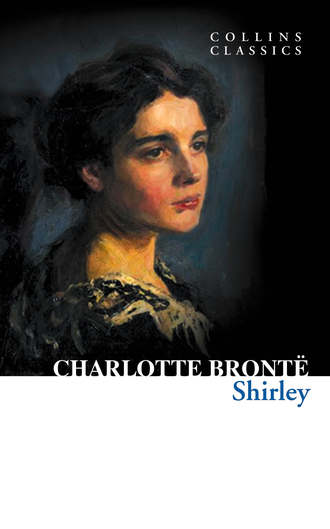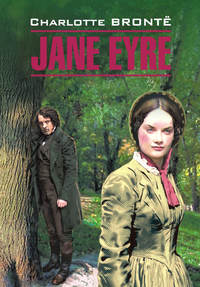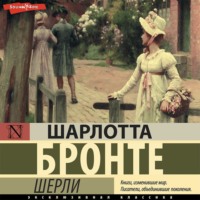
Полная версия
Shirley
“And how was he found out?”
“I’ll tell you, sir,” said Joe. “T’ maister’s not so fond of talking. I’ve no objections. He courted Sarah, Mr. Moore’s sarvant lass, and so it seems she would have nothing to say to him; she either didn’t like his wooden leg or she’d some notion about his being a hypocrite. Happen (for women is queer hands; we may say that amang werseln when there’s none of ’em nigh) she’d have encouraged him, in spite of his leg and his deceit, just to pass time like. I’ve known some on ’em do as mich, and some o’ t’ bonniest and mimmest-looking, too—ay, I’ve seen clean, trim young things, that looked as denty and pure as daisies, and wi’ time a body fun’ ’em out to be nowt but stinging, venomed nettles.”
“Joe’s a sensible fellow,” interjected Helstone.
“Howsiver, Sarah had another string to her bow. Fred Murgatroyd, one of our lads, is for her; and as women judge men by their faces—and Fred has a middling face, while Moses is none so handsome, as we all knaw—the lass took on wi’ Fred. A two-three months sin’, Murgatroyd and Moses chanced to meet one Sunday night; they’d both come lurking about these premises wi’ the notion of counselling Sarah to tak a bit of a walk wi’ them. They fell out, had a tussle, and Fred was worsted, for he’s young and small, and Barraclough, for all he has only one leg, is almost as strong as Sugden there—indeed, anybody that hears him roaring at a revival or a love-feast may be sure he’s no weakling.”
“Joe, you’re insupportable,” here broke in Mr. Moore. “You spin out your explanation as Moses spins out his sermons. The long and short of it is, Murgatroyd was jealous of Barraclough; and last night, as he and a friend took shelter in a barn from a shower, they heard and saw Moses conferring with some associates within. From their discourse it was plain he had been the leader, not only at Stilbro’ Moor, but in the attack on Sykes’s property. Moreover they planned a deputation to wait on me this morning, which the tailor is to head, and which, in the most religious and peaceful spirit, is to entreat me to put the accursed thing out of my tent. I rode over to Whinbury this morning, got a constable and a warrant, and I am now waiting to give my friend the reception he deserves. Here, meantime, comes Sykes. Mr. Helstone, you must spirit him up. He feels timid at the thoughts of prosecuting.”
A gig was heard to roll into the yard. Mr. Sykes entered—a tall stout man of about fifty, comely of feature, but feeble of physiognomy. He looked anxious.
“Have they been? Are they gone? Have you got him? Is it over?” he asked.
“Not yet,” returned Moore with phlegm. “We are waiting for them.”
“They’ll not come; it’s near noon. Better give it up. It will excite bad feeling—make a stir—cause perhaps fatal consequences.”
“You need not appear,” said Moore. “I shall meet them in the yard when they come; you can stay here.”
“But my name must be seen in the law proceedings. A wife and family, Mr. Moore—a wife and family make a man cautious.”
Moore looked disgusted. “Give way, if you please,” said he; “leave me to myself. I have no objection to act alone; only be assured you will not find safety in submission. Your partner Pearson gave way, and conceded, and forbore. Well, that did not prevent them from attempting to shoot him in his own house.”
“My dear sir, take a little wine and water,” recommended Mr. Helstone. The wine and water was hollands and water, as Mr. Sykes discovered when he had compounded and swallowed a brimming tumbler thereof. It transfigured him in two minutes, brought the colour back to his face, and made him at least word-valiant. He now announced that he hoped he was above being trampled on by the common people; he was determined to endure the insolence of the working-classes no longer; he had considered of it, and made up his mind to go all lengths; if money and spirit could put down these rioters, they should be put down; Mr. Moore might do as he liked, but he—Christie Sykes—would spend his last penny in law before he would be beaten; he’d settle them, or he’d see.
“Take another glass,” urged Moore.
Mr. Sykes didn’t mind if he did. This was a cold morning (Sugden had found it a warm one); it was necessary to be careful at this season of the year—it was proper to take something to keep the damp out; he had a little cough already (here he coughed in attestation of the fact); something of this sort (lifting the black bottle) was excellent, taken medicinally (he poured the physic into his tumbler); he didn’t make a practice of drinking spirits in a morning, but occasionally it really was prudent to take precautions.
“Quite prudent, and take them by all means,” urged the host.
Mr. Sykes now addressed Mr. Helstone, who stood on the hearth, his shovel-hat on his head, watching him significantly with his little, keen eyes.
“You, sir, as a clergyman,” said he, “may feel it disagreeable to be present amidst scenes of hurry and flurry, and, I may say, peril. I dare say your nerves won’t stand it. You’re a man of peace, sir; but we manufacturers, living in the world, and always in turmoil, get quite belligerent. Really, there’s an ardour excited by the thoughts of danger that makes my heart pant. When Mrs. Sykes is afraid of the house being attacked and broke open—as she is every night—I get quite excited. I couldn’t describe to you, sir, my feelings. Really, if anybody was to come—thieves or anything—I believe I should enjoy it, such is my spirit.”
The hardest of laughs, though brief and low, and by no means insulting, was the response of the rector. Moore would have pressed upon the heroic mill-owner a third tumbler, but the clergyman, who never transgressed, nor would suffer others in his presence to transgress, the bounds of decorum, checked him.
“Enough is as good as a feast, is it not, Mr. Sykes?” he said; and Mr. Sykes assented, and then sat and watched Joe Scott remove the bottle at a sign from Helstone, with a self-satisfied simper on his lips and a regretful glisten in his eye. Moore looked as if he should have liked to fool him to the top of his bent. What would a certain young kinswoman of his have said could she have seen her dear, good, great Robert—her Coriolanus—just now? Would she have acknowledged in that mischievous, sardonic visage the same face to which she had looked up with such love, which had bent over her with such gentleness last night? Was that the man who had spent so quiet an evening with his sister and his cousin—so suave to one, so tender to the other—reading Shakespeare and listening to Chenier?
Yes, it was the same man, only seen on a different side—a side Caroline had not yet fairly beheld, though perhaps she had enough sagacity faintly to suspect its existence. Well, Caroline had, doubtless, her defective side too. She was human. She must, then, have been very imperfect; and had she seen Moore on his very worst side, she would probably have said this to herself and excused him. Love can excuse anything except meanness; but meanness kills love, cripples even natural affection; without esteem true love cannot exist. Moore, with all his faults, might be esteemed; for he had no moral scrofula in his mind, no hopeless polluting taint—such, for instance, as that of falsehood; neither was he the slave of his appetites. The active life to which he had been born and bred had given him something else to do than to join the futile chase of the pleasure-hunter. He was a man undegraded, the disciple of reason, not the votary of sense. The same might be said of old Helstone. Neither of these two would look, think, or speak a lie; for neither of them had the wretched black bottle, which had just been put away, any charms. Both might boast a valid claim to the proud title of “lord of the creation,” for no animal vice was lord of them; they looked and were superior beings to poor Sykes.
A sort of gathering and trampling sound was heard in the yard, and then a pause. Moore walked to the window; Helstone followed. Both stood on one side, the tall junior behind the under-sized senior, looking forth carefully, so that they might not be visible from without. Their sole comment on what they saw was a cynical smile flashed into each other’s stern eyes.
A flourishing oratorical cough was now heard, followed by the interjection “Whisht!” designed, as it seemed, to still the hum of several voices. Moore opened his casement an inch or two to admit sound more freely.
“Joseph Scott,” began a snuffling voice—Scott was standing sentinel at the counting-house door—“might we inquire if your master be within, and is to be spoken to?”
“He’s within, ay,” said Joe nonchalantly.
“Would you then, if you please” (emphasis on “you”), “have the goodness to tell him that twelve gentlemen wants to see him.”
“He’d happen ax what for,” suggested Joe. “I mught as weel tell him that at t’ same time.”
“For a purpose,” was the answer. Joe entered.
“Please, sir, there’s twelve gentlemen wants to see ye, ‘for a purpose.’”
“Good, Joe; I’m their man.—Sugden, come when I whistle.”
Moore went out, chuckling dryly. He advanced into the yard, one hand in his pocket, the other in his waistcoat, his cap brim over his eyes, shading in some measure their deep dancing ray of scorn. Twelve men waited in the yard, some in their shirt-sleeves, some in blue aprons. Two figured conspicuously in the van of the party. One, a little dapper strutting man with a turned-up nose; the other a broad-shouldered fellow, distinguished no less by his demure face and cat like, trustless eyes than by a wooden leg and stout crutch. There was a kind of leer about his lips; he seemed laughing in his sleeve at some person or thing; his whole air was anything but that of a true man.
“Good-morning, Mr. Barraclough,” said Moore debonairly, for him.
“Peace be unto you!” was the answer, Mr. Barraclough entirely closing his naturally half-shut eyes as he delivered it.
“I’m obliged to you. Peace is an excellent thing; there’s nothing I more wish for myself. But that is not all you have to say to me, I suppose? I imagine peace is not your purpose?”
“As to our purpose,” began Barraclough, “it’s one that may sound strange and perhaps foolish to ears like yours, for the childer of this world is wiser in their generation than the childer of light.”
“To the point, if you please, and let me hear what it is.”
“Ye’se hear, sir. If I cannot get it off, there’s eleven behint can help me. It is a grand purpose, and” (changing his voice from a half-sneer to a whine) “it’s the Looard’s own purpose, and that’s better.”
“Do you want a subscription to a new Ranter’s chapel, Mr. Barraclough? Unless your errand be something of that sort, I cannot see what you have to do with it.”
“I hadn’t that duty on my mind, sir; but as Providence has led ye to mention the subject, I’ll make it i’ my way to tak ony trifle ye may have to spare; the smallest contribution will be acceptable.”
With that he doffed his hat, and held it out as a begging-box, a brazen grin at the same time crossing his countenance.
“If I gave you sixpence you would drink it.”
Barraclough uplifted the palms of his hands and the whites of his eyes, evincing in the gesture a mere burlesque of hypocrisy.
“You seem a fine fellow,” said Moore, quite coolly and dryly; “you don’t care for showing me that you are a double-dyed hypocrite, that your trade is fraud. You expect indeed to make me laugh at the cleverness with which you play your coarsely farcical part, while at the same time you think you are deceiving the men behind you.”
Moses’ countenance lowered. He saw he had gone too far. He was going to answer, when the second leader, impatient of being hitherto kept in the background, stepped forward. This man did not look like a traitor, though he had an exceedingly self-confident and conceited air.
“Mr. Moore,” commenced he, speaking also in his throat and nose, and enunciating each word very slowly, as if with a view to giving his audience time to appreciate fully the uncommon elegance of the phraseology, “it might, perhaps, justly be said that reason rather than peace is our purpose. We come, in the first place, to request you to hear reason; and should you refuse, it is my duty to warn you, in very decided terms, that measures will be had resort to” (he meant recourse) “which will probably terminate in—in bringing you to a sense of the unwisdom, of the—the foolishness which seems to guide and guard your proceedings as a tradesman in this manufacturing part of the country. Hem! Sir, I would beg to allude that as a furriner, coming from a distant coast, another quarter and hemisphere of this globe, thrown, as I may say, a perfect outcast on these shores—the cliffs of Albion—you have not that understanding of huz and wer ways which might conduce to the benefit of the working-classes. If, to come at once to partic’lars, you’d consider to give up this here miln, and go without further protractions straight home to where you belong, it ‘ud happen be as well. I can see naught ageean such a plan.—What hev ye to say tull’t, lads?” turning round to the other members of the deputation, who responded unanimously, “Hear, hear!”
“Brayvo, Noah o’ Tim’s!” murmured Joe Scott, who stood behind Mr. Moore. “Moses’ll niver beat that. Cliffs o’ Albion, and t’ other hemisphere! My certy! Did ye come fro’ th’ Antarctic Zone, maister? Moses is dished.”
Moses, however, refused to be dished. He thought he would try again. Casting a somewhat ireful glance at “Noah o’ Tim’s,” he launched out in his turn; and now he spoke in a serious tone, relinquishing the sarcasm which he found had not answered.
“Or iver you set up the pole o’ your tent amang us, Mr. Moore, we lived i’ peace and quietness—yea, I may say, in all loving-kindness. I am not myself an aged person as yet, but I can remember as far back as maybe some twenty year, when hand-labour were encouraged and respected, and no mischief-maker had ventured to introduce these here machines which is so pernicious. Now, I’m not a cloth-dresser myself, but by trade a tailor. Howsiver, my heart is of a softish nature. I’m a very feeling man, and when I see my brethren oppressed, like my great namesake of old, I stand up for ’em; for which intent I this day speak with you face to face, and advises you to part wi’ your infernal machinery, and tak on more hands.”
“What if I don’t follow your advice, Mr. Barraclough?”
“The Looard pardon you! The Looard soften your heart, sir!”
“Are you in connection with the Wesleyans now, Mr. Barraclough?”
“Praise God! Bless His name! I’m a joined Methody!”
“Which in no respect prevents you from being at the same time a drunkard and a swindler. I saw you one night a week ago laid dead-drunk by the roadside, as I returned from Stilbro’ market; and while you preach peace, you make it the business of your life to stir up dissension. You no more sympathize with the poor who are in distress than you sympathize with me. You incite them to outrage for bad purposes of your own; so does the individual called Noah of Tim’s. You two are restless, meddling, impudent scoundrels, whose chief motive-principle is a selfish ambition, as dangerous as it is puerile. The persons behind you are some of them honest though misguided men; but you two I count altogether bad.”
Barraclough was going to speak.
“Silence! You have had your say, and now I will have mine. As to being dictated to by you, or any Jack, Jem, or Jonathan on earth, I shall not suffer it for a moment. You desire me to quit the country; you request me to part with my machinery. In case I refuse, you threaten me. I do refuse—point-blank! Here I stay, and by this mill I stand, and into it will I convey the best machinery inventors can furnish. What will you do? The utmost you can do—and this you will never dare to do—is to burn down my mill, destroy its contents, and shoot me. What then? Suppose that building was a ruin and I was a corpse—what then, you lads behind these two scamps? Would that stop invention or exhaust science? Not for the fraction of a second of time! Another and better gig-mill would rise on the ruins of this, and perhaps a more enterprising owner come in my place. Hear me! I’ll make my cloth as I please, and according to the best lights I have. In its manufacture I will employ what means I choose. Whoever, after hearing this, shall dare to interfere with me may just take the consequences. An example shall prove I’m in earnest.”
He whistled shrill and loud. Sugden, his staff and warrant, came on the scene.
Moore turned sharply to Barraclough. “You were at Stilbro’,” said he; “I have proof of that. You were on the moor, you wore a mask, you knocked down one of my men with your own hand—you! a preacher of the gospel!—Sugden, arrest him!”
Moses was captured. There was a cry and a rush to rescue, but the right hand which all this while had lain hidden in Moore’s breast, reappearing, held out a pistol.
“Both barrels are loaded,” said he. “I’m quite determined! Keep off!”
Stepping backwards, facing the foe as he went, he guarded his prey to the counting-house. He ordered Joe Scott to pass in with Sugden and the prisoner, and to bolt the door inside. For himself, he walked backwards and forwards along the front of the mill, looking meditatively on the ground, his hand hanging carelessly by his side, but still holding the pistol. The eleven remaining deputies watched him some time, talking under their breath to each other. At length one of them approached. This man looked very different from either of the two who had previously spoken; he was hard-favoured, but modest and manly-looking.
“I’ve not much faith i’ Moses Barraclough,” said he, “and I would speak a word to you myseln, Mr. Moore. It’s out o’ no ill-will that I’m here, for my part; it’s just to mak a effort to get things straightened, for they’re sorely a-crooked. Ye see we’re ill off—varry ill off; wer families is poor and pined. We’re thrown out o’ work wi’ these frames; we can get nought to do; we can earn nought. What is to be done? Mun we say, wisht! and lig us down and dee? Nay; I’ve no grand words at my tongue’s end, Mr. Moore, but I feel that it wad be a low principle for a reasonable man to starve to death like a dumb cratur. I willn’t do’t. I’m not for shedding blood: I’d neither kill a man nor hurt a man; and I’m not for pulling down mills and breaking machines—for, as ye say, that way o’ going on’ll niver stop invention; but I’ll talk—I’ll mak as big a din as ever I can. Invention may be all right, but I know it isn’t right for poor folks to starve. Them that governs mun find a way to help us; they mun make fresh orderations. Ye’ll say that’s hard to do. So mich louder mun we shout out then, for so much slacker will t’ Parliament-men be to set on to a tough job.”
“Worry the Parliament-men as much as you please,” said Moore; “but to worry the mill-owners is absurd, and I for one won’t stand it.”
“Ye’re a raight hard un!” returned the workman. “Willn’t ye gie us a bit o’ time? Willn’t ye consent to mak your changes rather more slowly?”
“Am I the whole body of clothiers in Yorkshire? Answer me that.”
“Ye’re yourseln.”
“And only myself. And if I stopped by the way an instant, while others are rushing on, I should be trodden down. If I did as you wish me to do, I should be bankrupt in a month; and would my bankruptcy put bread into your hungry children’s mouths? William Farren, neither to your dictation nor to that of any other will I submit. Talk to me no more about machinery. I will have my own way. I shall get new frames in to-morrow. If you broke these, I would still get more. I’ll never give in.”
Here the mill-bell rang twelve o’clock. It was the dinner-hour. Moore abruptly turned from the deputation and re-entered his counting-house.
His last words had left a bad, harsh impression; he, at least, had “failed in the disposing of a chance he was lord of.” By speaking kindly to William Farren—who was a very honest man, without envy or hatred of those more happily circumstanced than himself, thinking it no hardship and no injustice to be forced to live by labour, disposed to be honourably content if he could but get work to do—Moore might have made a friend. It seemed wonderful how he could turn from such a man without a conciliatory or a sympathizing expression. The poor fellow’s face looked haggard with want; he had the aspect of a man who had not known what it was to live in comfort and plenty for weeks, perhaps months, past, and yet there was no ferocity, no malignity in his countenance; it was worn, dejected, austere, but still patient. How could Moore leave him thus, with the words, “I’ll never give in,” and not a whisper of good-will, or hope, or aid?
Farren, as he went home to his cottage—once, in better times, a decent, clean, pleasant place, but now, though still clean, very dreary, because so poor—asked himself this question. He concluded that the foreign mill-owner was a selfish, an unfeeling, and, he thought, too, a foolish man. It appeared to him that emigration, had he only the means to emigrate, would be preferable to service under such a master. He felt much cast down—almost hopeless.
On his entrance his wife served out, in orderly sort, such dinner as she had to give him and the bairns. It was only porridge, and too little of that. Some of the younger children asked for more when they had done their portion—an application which disturbed William much. While his wife quieted them as well as she could, he left his seat and went to the door. He whistled a cheery stave, which did not, however, prevent a broad drop or two (much more like the “first of a thunder-shower” than those which oozed from the wound of the gladiator) from gathering on the lids of his gray eyes, and plashing thence to the threshold. He cleared his vision with his sleeve, and the melting mood over, a very stern one followed.
He still stood brooding in silence, when a gentleman in black came up—a clergyman, it might be seen at once, but neither Helstone, nor Malone, nor Donne, nor Sweeting. He might be forty years old; he was plain-looking, dark-complexioned, and already rather gray-haired. He stooped a little in walking. His countenance, as he came on, wore an abstracted and somewhat doleful air; but in approaching Farren he looked up, and then a hearty expression illuminated the preoccupied, serious face.
“Is it you, William? How are you?” he asked.
“Middling, Mr. Hall. How are ye? Will ye step in and rest ye?”
Mr. Hall, whose name the reader has seen mentioned before (and who, indeed, was vicar of Nunnely, of which parish Farren was a native, and from whence he had removed but three years ago to reside in Briarfield, for the convenience of being near Hollow’s Mill, where he had obtained work), entered the cottage, and having greeted the good-wife and the children, sat down. He proceeded to talk very cheerfully about the length of time that had elapsed since the family quitted his parish, the changes which had occurred since; he answered questions touching his sister Margaret, who was inquired after with much interest; he asked questions in his turn, and at last, glancing hastily and anxiously round through his spectacles (he wore spectacles, for he was short-sighted) at the bare room, and at the meagre and wan faces of the circle about him—for the children had come round his knee, and the father and mother stood before him—he said abruptly,—
“And how are you all? How do you get on?”
Mr. Hall, be it remarked, though an accomplished scholar, not only spoke with a strong northern accent, but, on occasion, used freely north-country expressions.
“We get on poorly,” said William; “we’re all out of work. I’ve selled most o’ t’ household stuff, as ye may see; and what we’re to do next, God knows.”
“Has Mr. Moore turned you off?”
“He has turned us off; and I’ve sich an opinion of him now that I think if he’d tak me on again to-morrow I wouldn’t work for him.”
“It is not like you to say so, William.”
“I know it isn’t; but I’m getting different to mysel’; I feel I am changing. I wadn’t heed if t’ bairns and t’ wife had enough to live on; but they’re pinched—they’re pined—”









